#beyond love & beyond a supposed intrinsic value & even beyond forgiveness
Explore tagged Tumblr posts
Text
The freedom we give to ourselves

How does one find freedom in a cruel and cynical world? What does freedom even mean? What would it feel like? How will we know when we see it? These have been recurring questions throughout this story. We seem to explore attempts at the answer to this question through the perspective of characters.

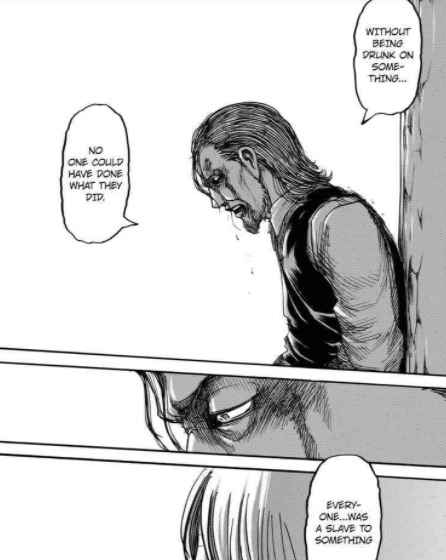
Kenny Ackerman’s life in pursuit of power led him to realise a truth about himself and the people around him. this idea of being drunk on something. That People need something to believe in to keep them going, to keep them from being broken by life’s suffering. Something that they hope gives each of their lives meaning. Each character’s pursuit towards this idea is what they believe will give them freedom from suffering.
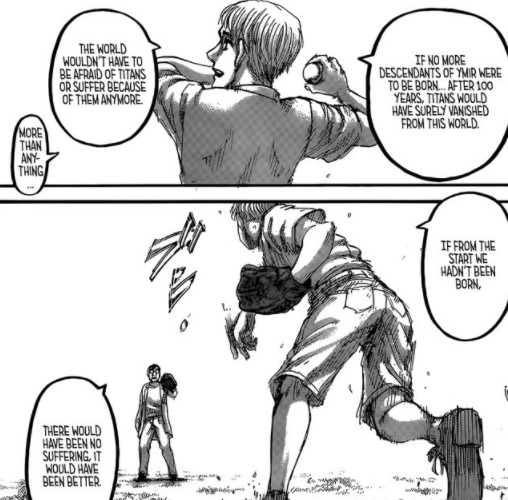
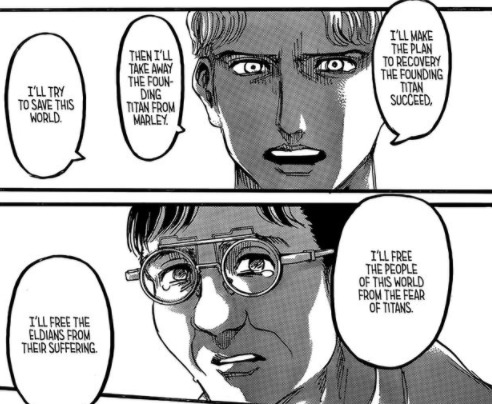
Zeke was no exception to this, he sees the suffering he experienced as a suffering inherent in being an Eldian in this world. He was drunk on the idea that his and the collective suffering would stop if Eldians ceased to exist.

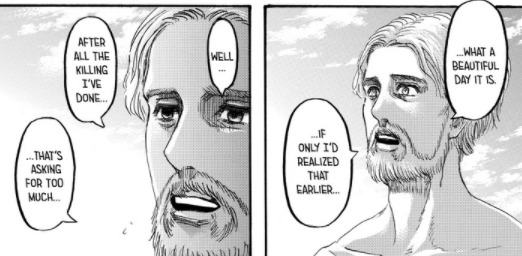
Despite this proposition, Zeke was able to find true freedom not by pursuing his personal mission through to the end but by letting it go. This push to move forward: to explain himself, his life, his suffering. It has brought him only more dissatisfaction and pain. He kept moving forward and when Eren took power from Ymir he was just sitting inert in Paths. It is not until his conversation with Armin that he truly looks back and reflects. Armin talks about a time where he was just having an aimless moment shared between loved ones. Zeke looks within and finds himself playing catch with Xaver. It has no meaning but it is a moment in his life where he’s not suffering but nor is he striving to push forward with some grand purpose. He is simply… existing. Without complication. Without justification. He is just someone who exists in this world because he was born into it. A simple moment with a profound effect: that life has intrinsic value and purpose regardless of how cruel it may seem. Zeke has now found that peace he was looking for his entire life. That feeling stays with him right up to the moments of his death. He can’t take back all the blood he has shed but for a few moments to take in the clear sky of the day. He can just exist.
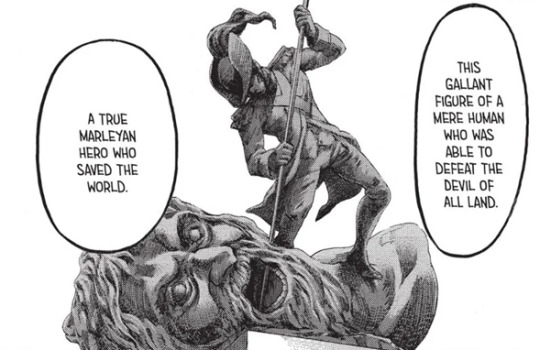
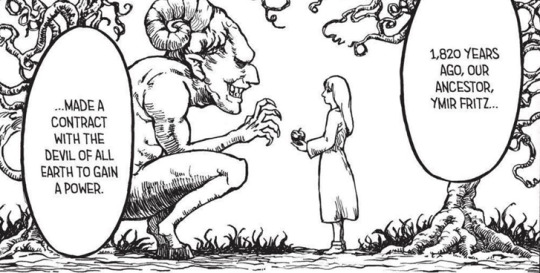

There has been an exhaustive debate in and out of the story of who or what the true devil of humanity is supposed to be. The devil of all earth that plagues humanity. I don’t believe it is Eren but I do believe he is the person in the story most seduced by it. I put forward that the devil of humanity isn’t a person born once in a generation, it is not a creature or some sort of supernatural force. The devil of humanity is the cycle of violence itself. A tiny glimmer of light or fear of the dark that pushes us into war, into chaos, into hell.
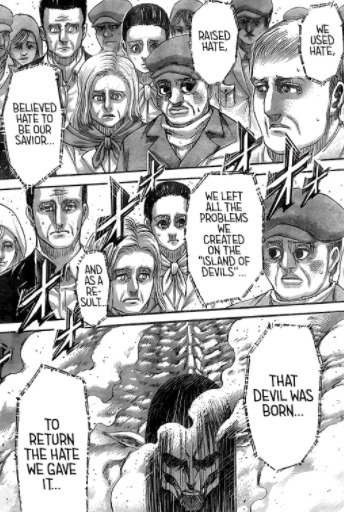
We may believe we see something beyond it. Something we can gain or something we fear will be taken from us if we don’t answer the call: “Do this and your dream will come true, you will be safe, you will be loved, the pain will stop” Just once. Then once again. Then once more. Before you know it, you are gripping the wheel of a sinking ship so heavy you have no hope of turning it on your own. But that may be the very thing that can stop it. Hope. The hope you give yourself in small acts of faith. Kindness. Compassion. Empathy. Seeing beyond the walls that trap your spirit. Not to seek out freedom taken from you but to reconnect with the freedom you always had that never left, your humanity.


If this is Isayama’s message, that freedom is in finding one’s humanity. One finds freedom by reconnecting with their humanity. I put forward that the most free person in this story has been Mr Blouse, Sasha’s father.

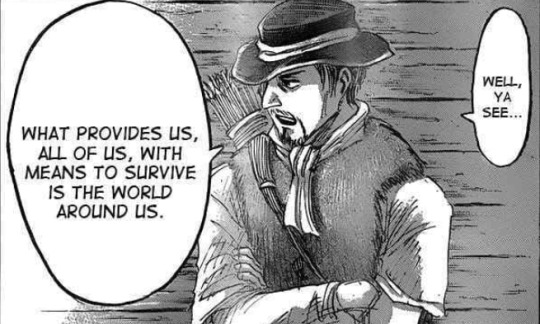
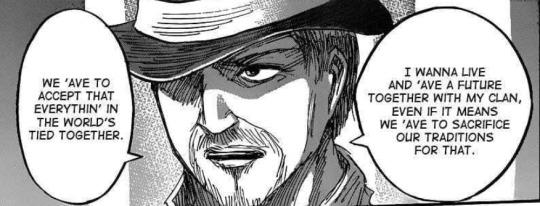

Mr Blouse is the person in the story most consistently connected to his own humanity and humanity as a collective whole. He makes it a principle to stay connected to it. So much so that when given a justifiable choice to take revenge on Gabi for killing his daughter. He instead chose to forgive her and console both her and Niccolo showing her the most humane act she had ever received. She did not have to justify her existence as a good Eldian in that moment, she was accepted as another person who deserved to exist even if she’d made mistakes.

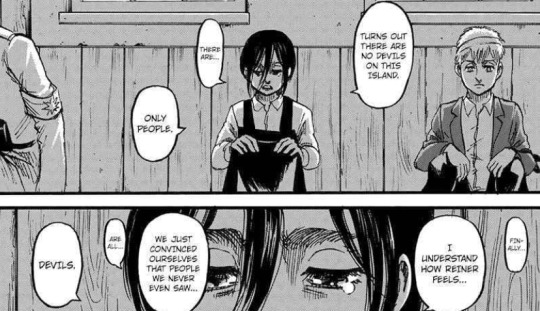
From Gabi’s experience and perspective, nothing made more sense than Mr Blouse killing her for what she did. What he decided to do was so simple yet its impact was profound. He reached Gabi because he saw something real beyond answering hate with hate. He sees a precious freedom beyond this cycle, and now thanks to what he did Gabi can see beyond it too and was able to find her humanity.
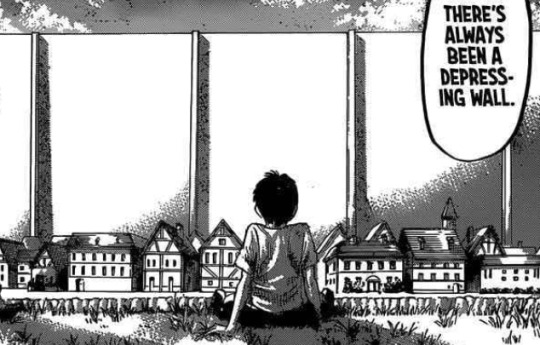
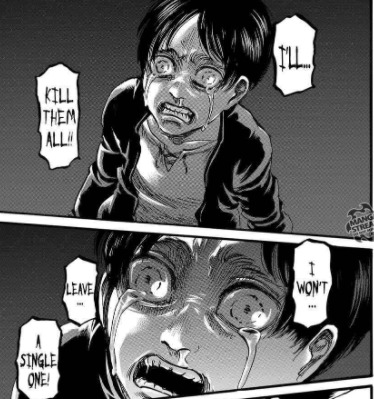
How does this relate to the main character of the story, Eren. Eren’s case is a very tragic one. No one is more emotionally attached to the idea of freedom than Eren, it has a specific imprint within his psyche. However there also lies the imprint of the wall within his psyche and all the trauma associated with it. From an early age Eren, at his most traumatised, found a resolve to find freedom from this horrific nightmare by destroying those who took his freedom from him at any cost. But in finding this resolve and trusting it above anything else, he had unknowingly damned himself.


The wall is so strongly associated with trauma in Eren’s mind, and now with the release of the wall titans, he is literally weaponizing his trauma and aiming it at the rest of the world. Yams is establishing that humanity is the only real freedom we have and Eren had always expected freedom to be beyond the walls. However, because of Eren’s compounded trauma, humanity is the ultimate enemy. In sacrificing his humanity and wiping all of it from the outside world, he is destroying the freedom he wanted for himself and for everyone in the world.
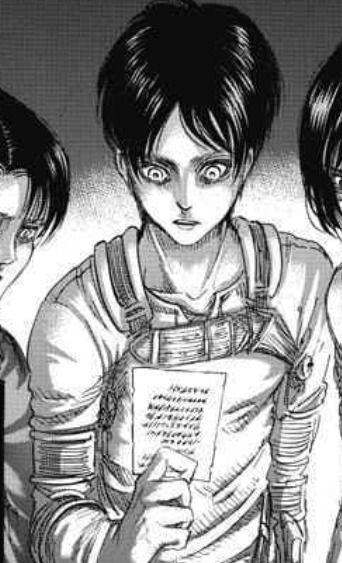
This happens all in the basement of his old home in Shiganshina. Eren was on the cusp of moving beyond his trauma when suddenly all of that pain, all of those triggers were reformatted, given new context when he learned the truth of his world. Why all of this pain and suffering happened to him. Once he met the formative father of his new world rebirth – Eren Kruger.


Eren has found stability in this turmoil by latching onto Kruger’s mindset, believing Kruger to embody what he needs to be to save those he cares about. In this new large and scary world, Eren sees Kruger as the person he will have to be to exist, to make a change. Eren has assimilated Kruger into his identity, evident from Eren taking Kruger’s name during his time spent in Marley. In how we are introduced to him post time skip, Eren is pursuing action using Kruger’s words to young Grisha about the Zeppelin.
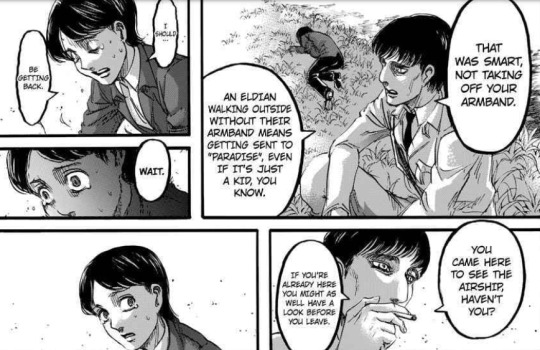
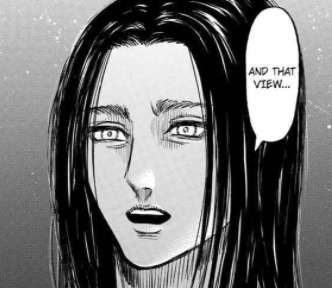
Freedom is hard fought and after fighting tooth and nail and suffering and pushing as hard as he can, he will have his freedom.
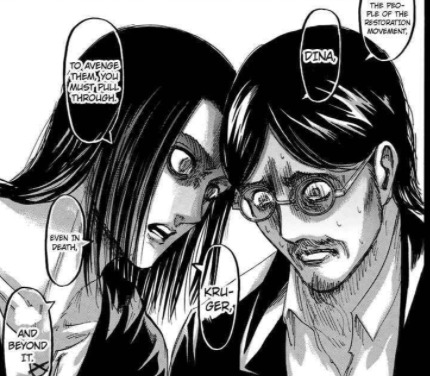

Culminating in the Jaeger trio at the Reiss family cave, we finally see how far Eren’s resolve has pushed him. Eren is not the devil but he is the one most seduced by it (pushing forward the cycle of violence). He tells Grisha to do this to justify his own belief that this was necessary. To sacrifice his humanity, the humanity he managed to find in the walls after a life of pain and anger as soldier of revolutionary radicalism. For Eren, sacrificing one’s humanity is what is necessary. But Eren misunderstood what he was supposed to take away from Kruger’s life.



There is an additional meaning behind Kruger’s final words to Grisha – in sacrificing his humanity to get to this point, he has lost everything precious to him. All that exists is the end goal, the zeppelin. Seeing the zeppelin is… all there is. It won’t give you back what you lost or what you have told yourself you need to take back: aka your humanity. Eren’s “sight” is the zeppelin and he believes seeing it will give him back the freedom taken from him. It’s no coincidence that Grisha looks like Eren when he reflects on the day that traumatised him the most.
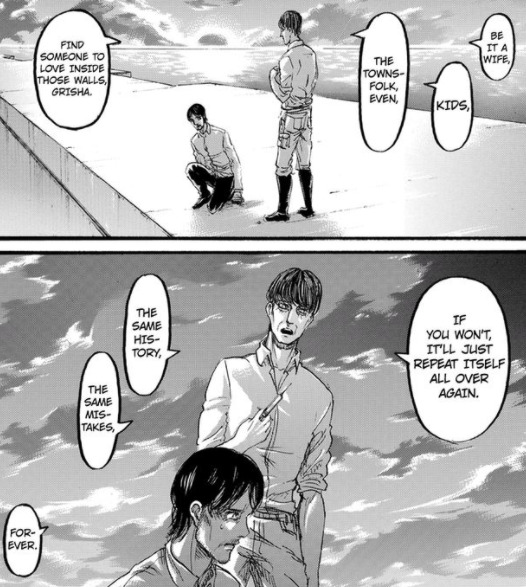
We see Kruger talking to Grisha further after he is given his mission. As Kruger prepares the serum for Grisha he mentions that he won’t know who will be watching this memory. If we take the ironic nature of this story into consideration, this can also mean that he doesn’t know if whomever is watching these memories will stop watching before he is about to say what he says. It takes place at the end of the chapter after we see Eren finding his new resolve and coming to grips with what he has learned and what he needs to do. This may be implying that this further discussion between Kruger and Grisha is something that Eren didn’t actually see. Kruger’s final important message to Grisha is to love someone. Be it a wife, a friend, the people around you. In specific terms, treasure your humanity and preserve it no matter what happens. Like Mr. Blouse, treasure the humanity found in others, even in enemies who have wronged you or may wrong you. Because that is what it means to find life intrinsically valuable. That is the only way to end this cycle of violence and ironically what Kruger has realised after losing so much of his own and now Eren in turn.


So if the path to freedom is to find one’s humanity does this mean that the cycle of violence can be wiped out and the devil of humanity will stop plaguing the world? I don’t think that’s a question Yam’s is capable of answering nor does he intend to.

However, I think he may propose that if it is possible for the main character of the story, the one who has been the most seduced by the cycle of violence and spilled the most blood is able to give himself back his humanity after willingly sacrificing so much of it. Then there is hope for anyone of us to find true freedom. Not everyone, but anyone. Because not just knowing but realising that we are all human, and valuing that, is what makes us truly free.
#snk 137#aot 137#snk theory#snk Eren#Eren#Eren Jaeger#Zeke Jaeger#Kenny Ackerman#Armin#aot meta#snk meta#Willy Tybur#aot theory#Sashas dad#Paradis#Ymir Fritz#Ymir#Paths#snk paths#Eren Kruger#Kruger#snk niccolo#Grisha Jaeger#Gabi#Snk Gabi#Gabi Braun#snk freedom
263 notes
·
View notes
Photo

What Is An Indulgence?
The Decree of Indulgence for Divine Mercy Sunday grants a plenary or full indulgence to those who satisfy certain conditions established by the Church and a partial (incomplete) indulgence to those who fulfill some but not all or the conditions.
A plenary indulgence means that by the merits of Jesus Christ, the Blessed Virgin Mary and all the saints, the full remission of the temporal punishment due to sacramentally forgiven sins is obtained. The person becomes as if just baptized and would fly immediately to heaven if he died in that instant. A partial indulgence means that a portion of the temporal punishment due to forgiven sin is remitted. Partial indulgences are received either by doing some act to which a partial indulgence is attached (e.g. praying a partially indulgenced prayer), or by the incomplete fulfillment of the conditions attached to a plenary indulgence.
Eternal and Temporal Punishment or Guilt
There are two kinds of punishment attached to sin, eternal and temporal. If the sin is mortal (serious, grave) sin, the person loses the friendship of God and with it the life of divine grace within. This punishment is eternal. If the person is not restored to grace before death he will be punished forever in hell, since serious sin is an infinite insult to an All-Holy God and thus deserves a like punishment. It was to repair for such sin that Jesus became man and was crucified. As God His sacrifice was infinitely meritorious, as Man He was able to represent us. He thus could expiate for our mortal sins, which are not just beyond our power of expiation but infinitely beyond it.
Mortal sin, and also venial sin (which has no eternal punishment attached to it), both disturb the right order within us and in the order of justice in general. We all experience these temporal (or in-time, in-this-world) consequences of sin, both both personally and socially. Sin changes us (or rather we sin because we are not what we are supposed to be), and like a pebble in a pond these changes have effects beyond us. Not only must we be sorry for our sins, but we must be more thoroughly converted to the Lord, and demonstrate that conversion (Acts 26:20) by our actions. So, while sacramental absolution forgives the eternal guilt of sin, which requires the infinite merits of Christ, it does not necessarily remove all the temporal punishment, since they are somewhat within our power to repair (and somewhat unknown to us). Depending on our degree of sorrow, absolution may result in the expiation of all the temporal guilt of sin. However, for that which it does not repair, we must offer further expiation through prayer, penance, carrying the Cross etc., or after death be purified in purgatory (Rev 21:27).
What an Indulgence does is to take an occasion of such expiation (a certain prayer, penance, charity or other designated work) and add to its intrinsic merit before God an additional value based on the treasury of merits of Jesus Christ, and those perfectly united to Him in heaven (the saints). This can either partially, or under certain conditions, totally remit the temporal punishment due to sin. This depends, naturally, on our openness to God's grace. A mechanical performance of an indulgenced work would not have effect. Performing an indulgenced work should have the consequence of fixing our will away from our sins and entirely on God. This is why among the most important of the conditions for receiving a plenary indulgence, and the hardest to satisfy, is the complete detachment or detestation of our sins. By detesting our sins we orient our will away from creatures (to the degree we love them inordinately), towards God. In this way we open our will to the action of His mercy flowing into our souls, which alone is able to effect the complete remission of the temporal punishment to our sins.
An example will perhaps better illustrate these points. A boy playing ball breaks a window of his home. Contrite and sorrowful he goes to his father, who forgives him. However, despite the forgiveness the window is still broken and must be repaired. Since the boy's personal resources are insufficient to pay for a new window, the father requires him to pay a few dollars from his savings and forego some of his allowance for several weeks, but that he, the father, will pay the rest. This balances justice and mercy (generous love). To ask the boy to do nothing, when it is possible for him to make some reparation, would not be in accordance with the truth, or even the boy's good. Yet, even this temporal debt is beyond the boy's possibilities. Therefore, from his own treasury the father generously makes up what the child cannot provide. This is indulgence. Unlike the theologies that say "we are washed it the blood of the Lamb and there is nothing left to do," Catholic teaching respects the natural order of justice, as Jesus clearly did in the Gospels, yet recognizes that man cannot foresee or undo all the temporal consequences of his sin. However, God in His mercy will satisfy justice for what we cannot repair.
Note on Partial Indulgences (days and years)
In the past partial indulgences were "counted" in days (e.g. 300 days) or years (e.g. 5 years). Catholics often mistakenly thought that this meant "time off of purgatory." Since there is no time in purgatory, as we understand it, it meant instead the remission of temporal punishment analogous to a certain amount of penitence as practiced in the early Church. This was a very generous standard, since the penitence required for sacramental absolution in the early centuries was arduous, indeed. However, with Pope Paul VI's 1968 revision of the Enchiridion Indulgentiarum (Collection or Handbook of Indulgences), this confusing way of counting partial indulgences was suppressed, and the evaluation of a partial indulgence left to God.
There are many prayers still circulating on prayer cards and in prayer books which have partial indulgences in days and years attached to them. However, all grants of indulgence issued prior to 1968, unless re-issued in the Enchiridion or specifically exempted by papal decree or privilege, were suppressed by Pope Paul VI. Thus, these many specific prayers with their attached indulgences, as well as the manner of measuring partial indulgences, are no longer valid. Some of them may still receive an indulgence, though, because of being re-issued in the new Enchiridion (e.g. the Anima Christi, the Prayer before a Crucifix and many other formal prayers). All other prayers previously indulgenced could, nonetheless, receive a partial indulgence under the general grants of indulgence which Pope Paul VI, and Pope John Paul II in his 1999 revision of the Enchiridion, established. These general grants establish partial indulgences for devout prayer, penitence and charity, and are a new and very generous inclusion in the Church's grants of indulgence. They have made it unnecessary to grant specific indulgences to prayers and other pious acts, as was done in the past.
2 notes
·
View notes
Text
GCSE Exams: Keeping a proportionate positive perspective.
Despite the fact that we’ve been running Y11 exams in one form or another for decades, there is always a fairly strong undercurrent in the discourse around the annual exam season characterised by a sense of injustice and unreasonableness. In relation to GCSEs, the following arguments are rehearsed fairly often:
Exams don’t measure everything that matters in a subject.
Exams don’t teach anyone anything – they’ll forget most of it.
There are too many exams condensed into a short time.
Or, conversely, the exam window is too long – too drawn out.
Exam pressure causes unjustifiable mental health issues -and this is rising.
Exams are too hard – which isn’t fair for some students.
GCSEs are shallow and don’t prepare students for higher levels of learning.
GCSEs don’t encourage a lifelong love of learning.
Exams are all about targets and league tables and we’re supposed to be educating rounded individuals.
And the usual dose of survivor bias – happy successful people who failed their exams always keen to celebrate this fact.
The annual confusion and ignorance about grade boundaries shifting (they have to and always will) and imagined conspiracies between examiners, Ofqual, the DFE and the Secretary of State to make us all miserable on purpose.
This recent article by Simon Jenkins is a classic example of this kind of anti-exam hysteria. It’s so way over the top, it’s hard to take any of the arguments seriously.
Let me restore some balance.
I think it’s very powerful to have a rigorous test to aim at when teaching a course – and learning one. It’s all too easy to graze over the surface of a subject, getting a general feel for it but not quite going in deep enough to really commit to learning, understanding and acquiring fluency at the level that is possible. The very fact of having an end-point assessment that really matters drives behaviours all along; it makes it all count; it makes you commit. Good teachers balance low-stakes formative learning with the process of getting ready for the high-stakes performance and step things up at the right moment. The intensity required to excel at GCSE pushes us all to secure deeper learning. If anyone suggested that, without exams, we’d reach deeper learning – I’d say they were wrong. We just wouldn’t.
As I report in this blog, GCSE Revision is Poetry: Intensity, hard work – and so much deep learning I’ve seen my son enjoy the business of getting to grips with learning, brimming with ideas and knowledge, thriving on the challenge of aiming high in lots of subjects.
We need to be realistic about what a system can be like if we want 16 year olds to gain valued qualifications in a range of subjects. (Arguably we could do away with GCSEs and just teach stuff or condense it all into one general qualification with subject elements, examined more tightly over a few days but that would require a much wider debate.) Meanwhile, qualifications require standards to be set; standards require thresholds; thresholds reference a bell-curve. (See here if you don’t understand this – I do really get tired of people who argue against norm referencing as if it’s a conspiracy. Every time someone says this, it just means they don’t know how assessment works. )
Exams can only ever measure parts of what makes up a subject. Of course. Obviously. Lots of things can be tested by exams but that doesn’t mean this is all that we value. It’s up to us to give value to a wider curriculum beyond the assessed curriculum. Yes, there is time pressure – but it’s still a choice we make in how and what we teach. Let’s have a nuanced debate about the scope of a curriculum, the content and structure of exams – but exams themselves need to be rigorous and tightly managed if they are to lead to credible qualifications. Grade inflation and dubious equivalences between subjects do nobody any good – because people don’t trust the whole system. Ed Balls never understood this. (The same man who ‘talked tough’ on standards and introduced the technical insanity of floor targets in a bell-curved system and should not be forgiven lightly for that…)
In my view there is a healthy pressure and work ethic that endpoint assessments generate. As a parent I’ve been quite happy to see my kids work really hard – super hard – for several months, motivated by the desire to succeed; to be ready to do their best. I totally reject the idea that this is intrinsically unfair or unhealthy or that the kind of exam revision required to get top GCSE grades is superficial and temporary. Would our kids know more in five years’ time if they hadn’t sat their exams – no! They’d know much less. They have much greater chance of remembering knowledge having had to revise extensively. This is particularly true, for both of my children and countless students I’ve taught, because the exam revision process had yielded multiple lightbulb moments. The intensity of study suddenly brings things together that were only half understood before. I had the same experience myself – I can still remember when A level chemistry suddenly all fell into place: not at school but in my room, at my desk, sweating it out ahead of my exams.
Passing on pressure to students or failing to keep them in perspective within a broader ‘love of the subject’ is an issue for schools, teachers and parents. And, of course, sometimes this can go wrong. The reported rise in mental health issues always cites a combination of factors – including social media and school work. It’s a complex message to give: to encourage/push students to excel, to risk failure, to aim high, to put themselves on the line… whilst also saying it’s ok if it goes wrong, that life goes on: that it matters a lot – but not *that* much. However, even if we accept the data, I don’t think it is possible to separate exam pressure from wider teenage mental health issues to the point that we might conclude that students shouldn’t do exams or that we should change their nature. It’s more that we need to give more value to other things as well. I don’t think it helps to argue that, because some young people do not cope well with exam pressure – or are not adequately supported to cope well – , that we should change this system for everyone.
The answer is not to soften the challenge – it is to do a better job of preparing students for it: academically and emotionally.
To keep the new GCSE reforms in perspective, let’s remember that there isn’t anything new to having a 4-6 week period in May and June packed with exams. I cringe every time someone blames Michael Gove for the existence of hard exams. Even if we might want to go back to coursework, Mode 3 assessments and fewer papers in Maths and History – it’s not as if the exam window is really significantly different to what it was. It has evolved but the basic format is largely the same, even with more terminal exams. I would say that getting rid of lots of coursework has been a blessing, freeing up time in the curriculum, removing really poor assessments and learning experiences like science ISAs and the annual parrot-fest of English speaking and listening assessments. (Your school might not have done this way – hundreds did.). Some things are better off being left out of exams.
What issues remain?
It’s not all perfect of course. But it’s often hard to raise concerns in a manner that doesn’t fuel the hysteria. Here are a few things we need to deal with:
Ideally exams would form just one part of a wider Baccalaureate system. Half the issues with the exam system stem from there being no nationally recognised framework to formally give value to everything else. Perhaps, if a proper English Bacc was the main thing, we could have less emphasis on qualifications at 16 – even we still set exams; they wouldn’t be quite so high-stakes.
Grades 1-3 need to be rescued from the dustbin of failure. It’s totally unnecessary; it’s wrong; ignorate even – to have a pass/fail in a system were thousands of children must fail. I’ll never forgive Nicky Morgan for her wilful ignorance in this area – when she destroyed the revolution 1-9 grades could have been.
For sure, the accountability pressure schools and teachers experience is misguided and over the top. We still have a ‘shock horror, half of children in bottom 50%’ level of understanding of what is possible within a cohort – in the media, in government, in governing body meetings, during inspections. Every governing body and Lead Inspector expects results to go up even when, de facto, this can’t happen for everyone.
I’m doubtful that we need three separate papers for any subject instead of two. A small reduction in total exam time would probably make little difference to grading but would ease the revision burden and reduce the total exam window time in a proportionate manner.
Post-16 we need a different qualification to aim at other than resitting English and Maths GCSE – repeated failure and disillusionment is hard-wired in the current system.
Progress 8 needs to be put in its place as the shaky-baseline noisy zero-sum average that it is – with dubious real value to any student and multiple negatives in terms of some short-term school curriculum choices.
We need to be cautious with 9s – taking care not to diminish 7s and 8s. 8s are the dominant A* standard and 9s will be noisy in relation to representing ‘true’ superiority in students’ relative capabilities in any subject. As a parent of someone ‘aiming at 9s’ in most subjects, I worry about how 8s will be valued in his eyes and the eyes of others. We’re all working hard to manage our hopes and expectations and keep it all in perspective.
For further assessment material, I’ve gathered lots of assessment-related blogs here:
Understanding Assessment: A blog guide
GCSE Exams: Keeping a proportionate positive perspective. published first on https://medium.com/@KDUUniversityCollege
0 notes